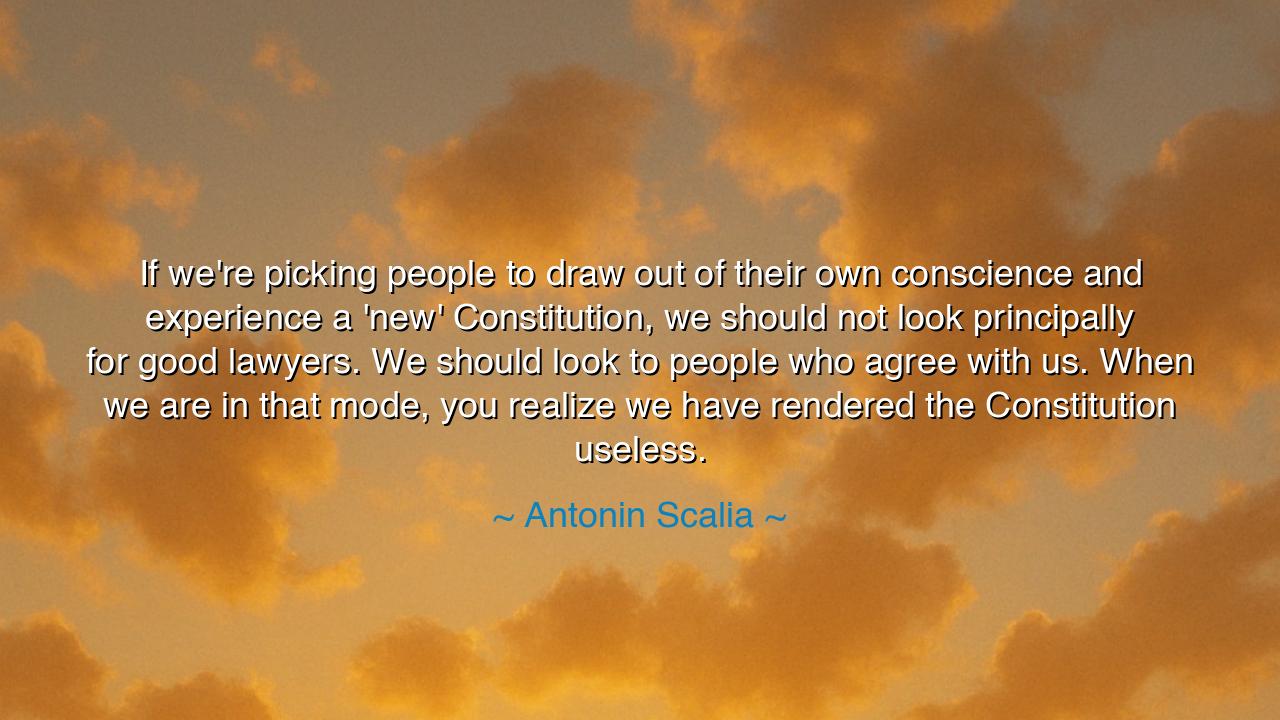
If we're picking people to draw out of their own conscience and
If we're picking people to draw out of their own conscience and experience a 'new' Constitution, we should not look principally for good lawyers. We should look to people who agree with us. When we are in that mode, you realize we have rendered the Constitution useless.






“If we’re picking people to draw out of their own conscience and experience a ‘new’ Constitution, we should not look principally for good lawyers. We should look to people who agree with us. When we are in that mode, you realize we have rendered the Constitution useless.” Thus spoke Justice Antonin Scalia, the fierce guardian of the written word, whose voice thundered with the conviction that law must stand above politics, and truth above the shifting tides of opinion. In this declaration, he warns not merely of a legal danger, but of a spiritual decay — the slow death of principle when the rule of law is replaced by the rule of preference. His words are a fire in the darkness, calling us to remember that justice cannot survive when it bends to the will of men, rather than the wisdom of enduring truth.
The origin of this quote lies in Scalia’s lifelong devotion to what he called originalism — the belief that the Constitution must be interpreted according to its original meaning, not reshaped by the mood or conscience of each generation. For Scalia, the Constitution was not a living organism to be molded by desire, but a covenant, a binding agreement among the people and their posterity. To treat it otherwise, he warned, would turn it into a weapon of ideology, a mirror reflecting not law but the faces of those in power. Thus, when he says that selecting judges for their “conscience and experience” renders the Constitution useless, he is lamenting a world where the foundation of liberty — the written law — is traded for the whims of the powerful.
This warning is as ancient as civilization itself. When Solon, the lawgiver of Athens, crafted the early code of that city, he bound its citizens not to their passions, but to the words inscribed in stone. For Solon knew that when laws become malleable, justice becomes arbitrary. Tyrants rise not from armies alone, but from the silence of those who allow meaning to shift with convenience. So too did Scalia see in his own age a new danger — not of soldiers at the gates, but of interpreters who, with gentle reasoning, would turn the Constitution into clay, reshaping it to fit the temper of their times. His voice was that of an ancient prophet, crying that when every judge becomes a legislator, the law itself loses its throne.
Consider, as an example, the fate of the Roman Republic. Its founders, too, built a system of checks and balances, a constitution meant to outlast men. But as generations passed, senators ceased to revere the code of their ancestors. They began to interpret it “flexibly,” justifying corruption, ambition, and power in the name of expedience. Soon, what had been a republic bound by law became an empire bound by will. The fall of Rome began not with the sword, but with the pen — not with war, but with the erosion of restraint. And so, Scalia’s warning is not confined to courts and judges; it is the eternal warning of history itself: that freedom cannot survive when principle yields to preference.
In his quote, Scalia reveals a profound truth about human nature — that people naturally seek agreement rather than wisdom. When we choose leaders, teachers, or judges merely because they “agree with us,” we are no longer seeking justice; we are seeking validation. But justice is not comfort; it is confrontation. It demands that we submit our desires to something higher — the written law, the enduring truth, the covenant that binds us beyond our factions. When Scalia says that the Constitution becomes useless in this mode, he means that it ceases to protect anyone. It becomes a mask worn by power, stripped of its sacred neutrality.
Yet his words are not despair, but a call to vigilance. For if the law is to endure, it must be loved as something sacred — defended not only by scholars and judges, but by the hearts of the people. The Constitution, or any law, is a living protection only so long as citizens honor it more than their opinions. Scalia reminds us that the greatness of a nation lies not in its comfort with change, but in its fidelity to principle. To love freedom is to love restraint; to love justice is to love the words that bind even kings and governments.
The lesson is clear and enduring: do not seek leaders, judges, or thinkers who flatter your beliefs; seek those who honor the truth above their own desires. Do not treat the laws of your land as relics to be reshaped by emotion, but as sacred compacts that guard your liberty. And when the world tempts you to forsake principle for expedience, remember that all empires fall when their foundations crack — but nations endure when they choose integrity over agreement, and law over whim.
Therefore, let us heed Scalia’s wisdom as one might heed the words of an elder at the gates of time. The Constitution, the code, the law — whatever form justice takes in a people’s heart — must remain firm, not because it is perfect, but because it is our covenant with each other. To preserve it is not to resist progress, but to ensure that progress does not devour freedom. For when the day comes that we shape justice only by our own reflection, then, as Scalia foretold, the law will be no more — and the world, once free, will stand defenseless against itself.






AAdministratorAdministrator
Welcome, honored guests. Please leave a comment, we will respond soon